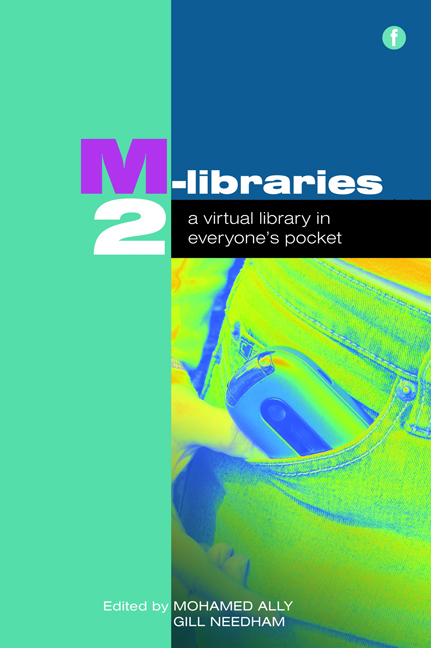Book contents
- Frontmatter
- Contents
- Acknowledgements
- Contributors
- Foreword
- Introduction
- PART 1 M-LIBRARIES: DEVELOPMENTS AROUND THE WORLD
- PART 2 TECHNOLOGY IN M-LIBRARIES
- PART 3 APPLICATION OF M-LIBRARIES
- 12 Mobile access for workplace and language training
- 13 Service models for information therapy services delivered to mobiles
- 14 Health literacy and healthy action in the connected age
- 15 ‘Ask us upstairs’: bringing roaming reference to the Paley stacks
- 16 The role of an agent supplying content on mobile devices
- 17 Portable science: podcasting as an outreach tool for a large academic science and engineering library
- PART 4 M-LIBRARIES AND LEARNING
- PART 5 BUILDING THE EVIDENCE BASE FOR M-LIBRARIES
- Conclusion
- Index
15 - ‘Ask us upstairs’: bringing roaming reference to the Paley stacks
from PART 3 - APPLICATION OF M-LIBRARIES
Published online by Cambridge University Press: 08 June 2018
- Frontmatter
- Contents
- Acknowledgements
- Contributors
- Foreword
- Introduction
- PART 1 M-LIBRARIES: DEVELOPMENTS AROUND THE WORLD
- PART 2 TECHNOLOGY IN M-LIBRARIES
- PART 3 APPLICATION OF M-LIBRARIES
- 12 Mobile access for workplace and language training
- 13 Service models for information therapy services delivered to mobiles
- 14 Health literacy and healthy action in the connected age
- 15 ‘Ask us upstairs’: bringing roaming reference to the Paley stacks
- 16 The role of an agent supplying content on mobile devices
- 17 Portable science: podcasting as an outreach tool for a large academic science and engineering library
- PART 4 M-LIBRARIES AND LEARNING
- PART 5 BUILDING THE EVIDENCE BASE FOR M-LIBRARIES
- Conclusion
- Index
Summary
Introduction
The internet, virtual access to library resources and mobile technologies have all changed settled patterns of library use. In order to find a meaningful role in the new relationship between users, technology, buildings and staff, librarians need patience, persistence and a willingness to experiment with new services. The ‘Ask Us Upstairs’ initiative, carried out in the fall and spring semesters of 2008–9, was an attempt to bring reference services to the Paley stacks, located on the second and third floors of Paley Library, where most of the Temple University Libraries’ book collection is housed. The Paley stacks also include study tables, comfortable seating and computer workstations. ‘Ask Us Upstairs’ was part of our ongoing efforts to move beyond the reference desk, to other parts of the library and, indeed, the campus, to provide reference services. Though the results were disappointing, many important insights were gained through the careful observation of user behaviour in and around our book collections.
The Samuel L. Paley Library, Temple University's central library, was built in 1966 and comprises four floors – a ground floor (basement) and three floors above. Patrons enter on the first floor, a very large open space with high ceilings, divided into east and west sides. The first floor houses the reference desk and reference collection, over 100 public computers, current journals and newspapers, comfortable seating, and a café. Floorto- ceiling windows surround three sides, providing a view of important campus thoroughfares. The first-floor entryways to the upper-level Paley Stacks are fairly well hidden from view and it's often a struggle just to make students aware of them. The lighting upstairs in the stacks is rather dim, as the outer walls were designed to keep out daylight, and the floor plan is uninspiring. The bookshelves are very high and the aisles are narrow, making for a rather unwelcome browsing environment. The infrastructure is outdated, making installation of additional electrical outlets and cable drops complicated and expensive.
The cost to renovate these floors aesthetically and functionally is prohibitive. Despite this, significant improvements have been made, due to a financial boost following the arrival of the new Dean of Libraries in 2005. In addition to building improvements, large ongoing investments have been made in both print and electronic resources. One of the first cash infusions enabled a large purchase of new and back-stock books across the disciplines.
- Type
- Chapter
- Information
- M-Libraries 2A virtual library in everyone's pocket, pp. 145 - 154Publisher: FacetPrint publication year: 2010



